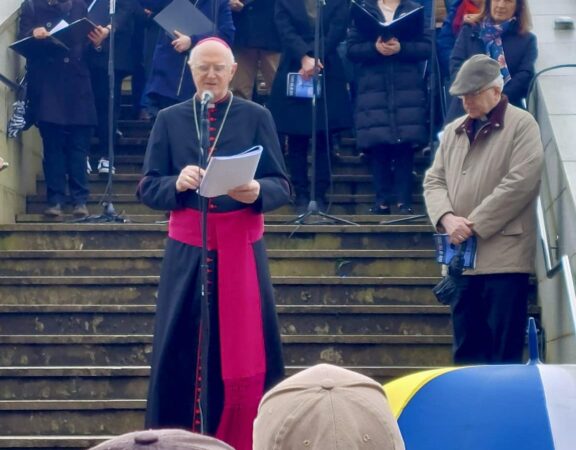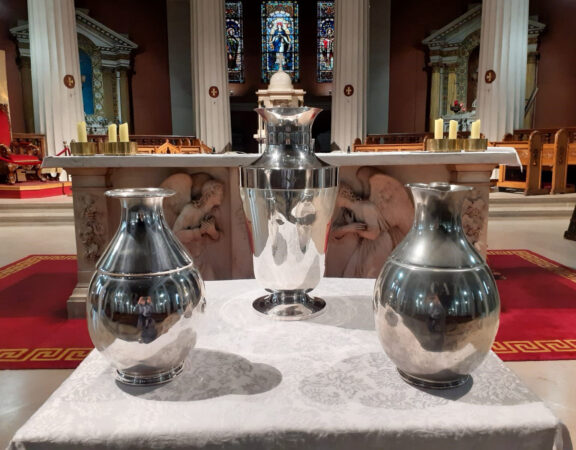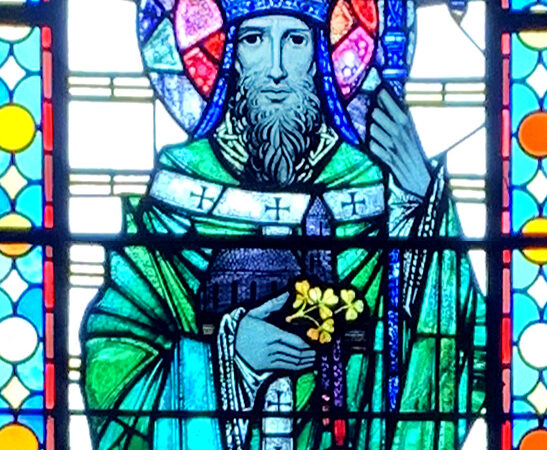First Sunday of Advent 2017
CLOSING MASS OF THE GOLDEN JUBILEE CELEBRATIONS OF
THE CHURCH OF THE HOLY SPIRIT BALLYROAN
Homily Notes of
Most Rev. Diarmuid Martin
Archbishop of Dublin
—————————————
Church of the Holy Spirit, Ballyroan, 3 December 2017
The Gospel reading of this first Sunday of Advent was written at a crucial time in the history of the early Church, a time in which the early Christians were facing a fundamental challenge about their identity and their future.
Many had thought that Jesus would return soon after his resurrection and bring his kingdom to full realisation in their own lifetime.
When this Gospel was being written, fifty or sixty years after Jesus’ return to his Father, Jesus second coming did not seem to be happening. Some felt that since his second coming had not taken place by that time, then it would never take place at all and they could fall back into old ways and live just like those who never knew Jesus. Others became distracted from true faith by all kinds of unfounded speculation and fantasies about when and how the Lord might return.
Saint Mark takes up words of Jesus and presents them in terms of an invitation to reflect on the present and the future. The early Christian were told to “be alert, be wakeful”. We Christians today receive the same invitation. This invitation is central to the Advent message.
We live in what we call an era of progress. Certainly, our modern times have brought huge benefits in terms of progress in health care, in terms of consumer choice, in terms of better education. Progress in information technology has broken down so many barriers of communication.
At the same time, we cannot overlook the negative effects that progress in our life-style may have brought with it. We have witnessed damage to the environment, an increased individualism with its effects on married and family life, and a weakening of the sense of community. Think of vast wealth that is generated but not always shared. We live in a world where we throw away tons of food each week and where we have children coming to school hungry. Think of the many, unfortunately, who have fallen victim to the life-style of modernity and who end up fragile, insecure, fearful, uncertain and even broken persons.
Progress is not linear. It is not always leading in the right direction. In his Encyclical on hope, Pope Benedict spoke of what he called “the ambiguity of progress”. Progress is not automatic; it requires vision, it requires commitment and it requires community.
We gather today to celebrate the fiftieth anniversary of this church. This is in many ways a unique parish. When it was established this was a new somewhat anonymous suburb of Dublin. There was no natural centre of community. It was this Church that began to turn the area from a group of isolated estates into a true community. Community was built up through commitment, the commitment of families who shared values about the Dublin of that day and the Dublin of the future.
The Church became a centre of community and around the Church community an extraordinary range of services, buildings and experiences sprung up, all interrelated and yet each one maintaining its focus and its leadership. First class parish schools grew up fully inserted into the life of the community.
If the walls of this Church could speak, they would reveal something even more important. The Church became the place where people came at the important moments of life: baptisms, marriages, and funerals. It also saw the ordination of priests from this community. People came in silent prayer in moments of trial. In the sacrament of reconciliation, people were lifted up from the burdens of sin and given a new freedom to get on with their lives.
Successive priests ministered here and later we will unveil a plaque remembering them and their ministry. They were exceptional priests. In more recent times, Father Brendan Madden threw all his energy, creativity, and personal kindness into making this a vibrant parish where there was a place of everyone and where everyone could take responsibility. I know that you have warmly welcomed Father Danny and his team.
When I talk about parishes in the future, I speak about “working together for mission”. Some think that this is just about different parishes coming together in clusters to meet certain needs. That is only part of the idea. More important, “working together for mission” is about parishes where people work together, where the talents of everyone are fostered in a common mission to see the person and the message of Jesus Christ realised in concrete ways in today’s society.
A Jubilee is a time to look back and give thanks. It is also a time of look to the future. Just like that time in which our Gospel reading was written, we are faced with challenges about our present and our future. How do we speak to our younger generation about living their faith in the future, about the world they will encounter and are called to construct?
We have also to ask what sort of Church will foster an ability to live faith in Jesus fully in an ambiguous world? Living our faith in our contemporary culture is not easy. Yet rarely has the culture of any period had such need of the message of Jesus Christ and the witness of men and women of faith.
The Church must become more and more the space where we learn not just formulae and catechism. We must learn from Jesus what I call “Gospel wisdom”, a wisdom that will offer that freedom to rise above the confusion in much of contemporary culture. We have to learn to renounce certain values for ourselves in order to live for others as Jesus did and then find joy and fulfilment in living the Gospel.
Advent is a special moment in which we can rediscover prayer, a prayer that unites us with the God who is faithful to us, even when we fail. Prayer turns our faith into a living faith that has a real sense of reaching out and having an impact in society. Prayer binds us to a God who is faithful and therefore is the roots of true hope.
This morning I find myself quoted in an American newspaper article that sets out to analyse how the place of God in Irish society has been relativized. What we are called to do however is something else: we must seek the ways to restore the place of God in society and above all in the hearts of our young people. We do that through seeking Gospel wisdom and its fruits of joy and hope. That is the challenge for the future of parish in our times.









